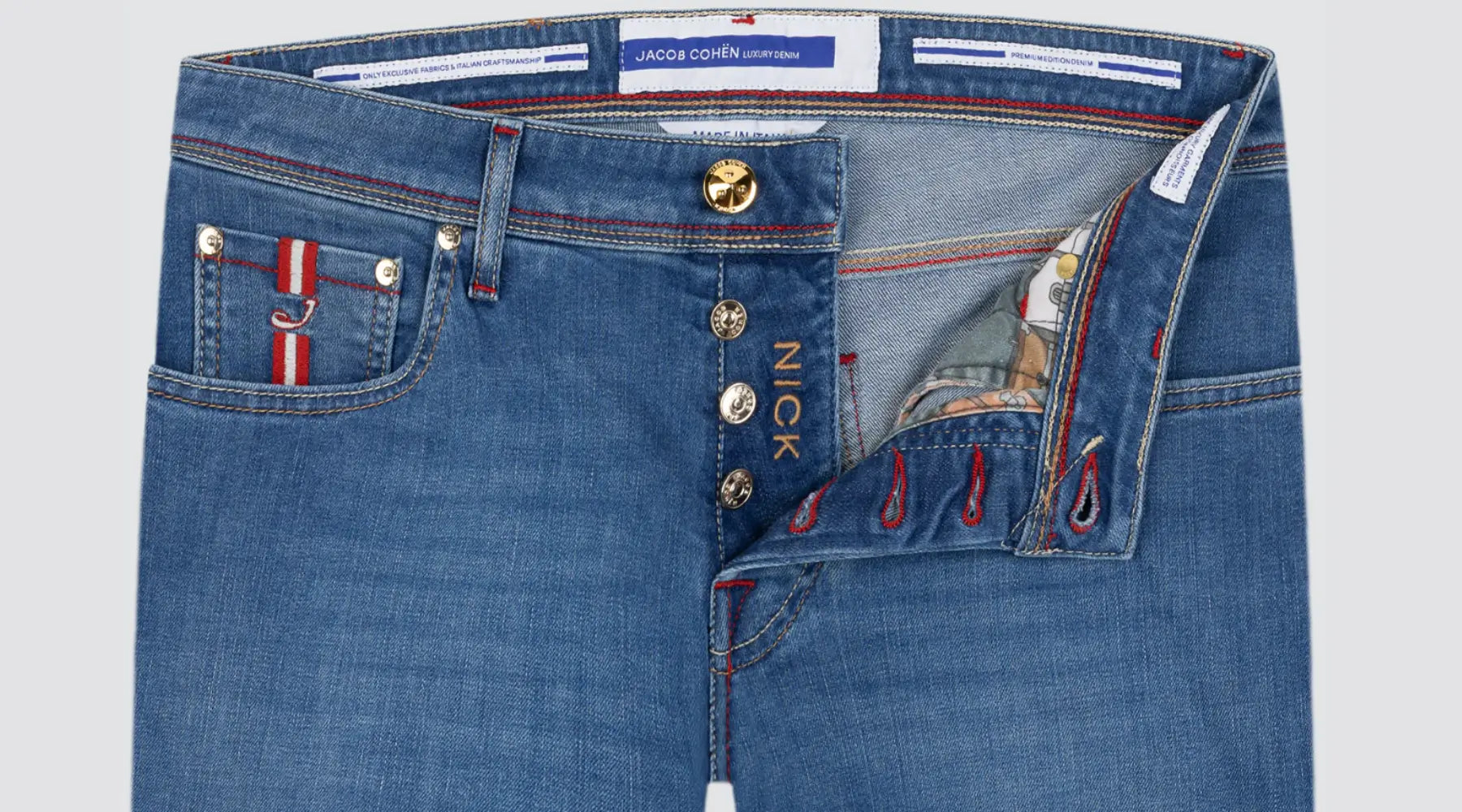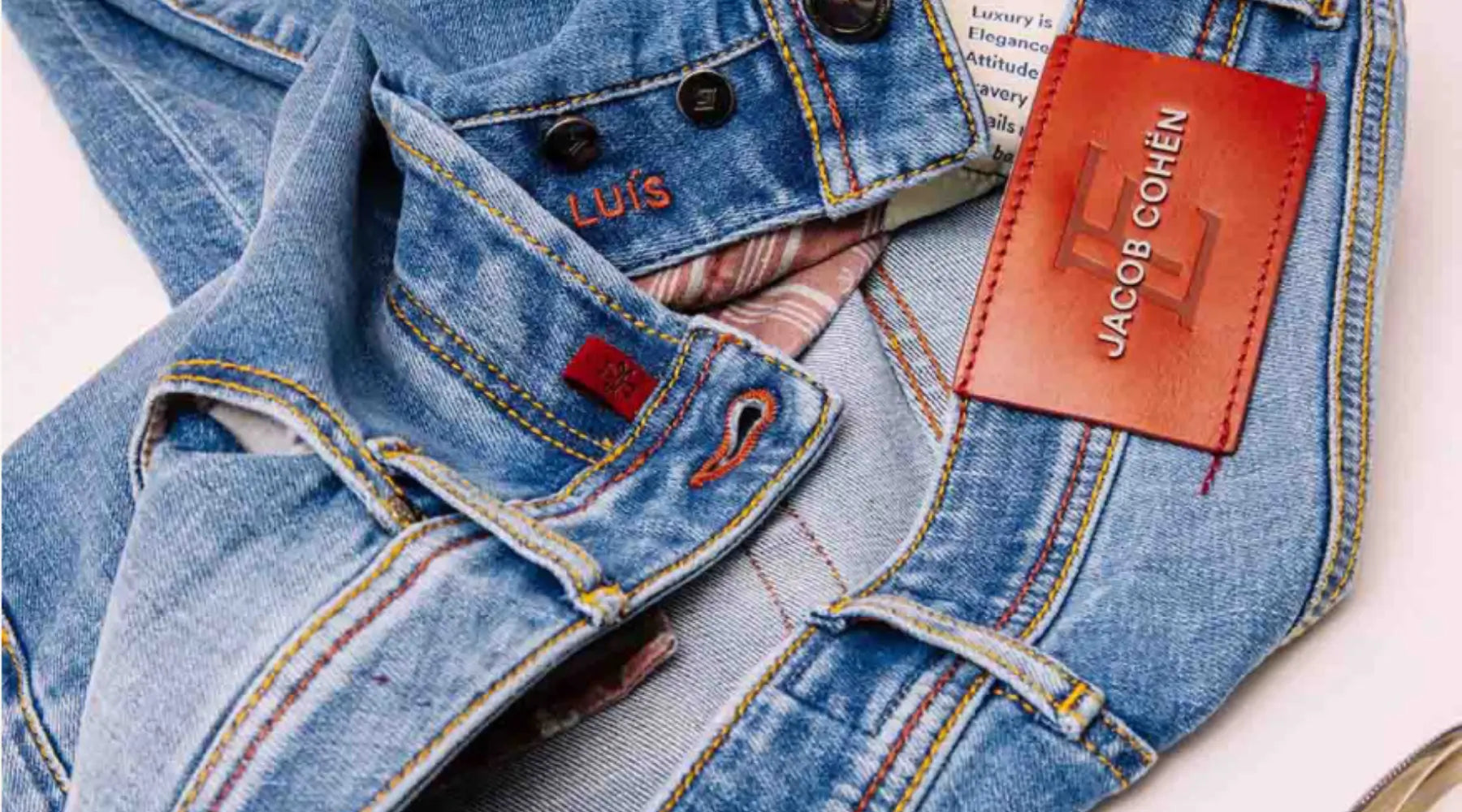
Behind the Seams: The Craftsmanship Behind Jacob Cohën Tailoring
Luxury denim wasn’t always a thing. But in 1985, when Tato Bardelle launched Jacob Cohën in Italy, he didn't just want to sell jeans—he wanted to redefine them. Back then, denim was rugged, rough, and considered far from high fashion. Yet Bardelle envisioned a future where denim would be as refined as tailored trousers, a staple not just for casual wear but for luxury wardrobes. When his son, Nicola Bardelle, took over creative direction in the early 2000s, that vision became a reality. Under Nicola's leadership, Jacob Cohën evolved into a denim house known for its precise tailoring, fine fabrics, and signature luxury touches.
More than a brand, Jacob Cohën is a statement. It's what happens when meticulous Italian craftsmanship meets an obsession with detail. And that’s exactly what sets it apart in a saturated market of denim labels. Each pair of jeans is not just sewn but sculpted—elevating denim from utility to artistry.
The Luxury Denim Niche and How Jacob Cohën Stands Out
When most people think of luxury fashion, names like Gucci or Prada come to mind—not jeans. But Jacob Cohën disrupted this assumption. How? By refusing to compromise. Every pair is made in Italy, using materials that are often reserved for haute couture. Even more impressive, these jeans are often paired with a shirt and blazer, showing that they belong in the boardroom just as much as they do at brunch.
While other denim brands rely heavily on mass production, Jacob Cohën sticks to its roots with a sartorial soul. This isn’t fast fashion—it’s fashion that takes its time. The brand's decision to craft denim with the same care used for suits reflects a rare commitment in today’s market. It’s not about trend-chasing. It’s about timeless quality.
Italian Heritage and Sartorial Elegance
The Influence of Italian Tailoring Traditions
Italy’s fashion history is rich with legendary tailoring houses. From Naples to Milan, Italian sartorial culture is known for its elegant cuts, soft construction, and the balance between comfort and style. Jacob Cohën borrows from this heritage—treating denim like wool or cashmere. The tailoring is evident in how the jeans drape, hug the body, and age gracefully over time.
This infusion of tradition is not superficial. Many tailors who work on Jacob Cohën pieces have backgrounds in formal wear. That experience translates into garments that fit like bespoke clothing. Think hand-stitched waistbands, tailored hems, and form-flattering silhouettes. It's as if every stitch whispers "Made in Italy" with pride.
The Intersection of Fashion and Craftsmanship
In a world where algorithms dictate trends and machines do most of the work, Jacob Cohën brings the human hand back into fashion. The craftsmanship here isn’t just technical; it’s deeply artistic. Tailors understand not just how to sew but how to sculpt, shape, and breathe life into fabric. The result? Pieces that feel alive—personal, unique, and rich with character.
It’s not just about looking good. It’s about feeling something when you wear them. That’s the difference between clothing and craftsmanship. And Jacob Cohën sits firmly on the latter side.

The Fabric of Excellence
Premium Materials That Define Jacob Cohën Jeans
Start with the fabric. Jacob Cohën doesn’t just pick any cotton—they source from the best. Their go-to? Organic cotton that's not only soft but sustainable. These fibers are long, durable, and capable of being woven into intricate patterns. They also hold dye exceptionally well, giving the jeans a rich, long-lasting color.
But that's just the start. For certain lines, the brand incorporates Japanese selvedge denim—arguably the finest in the world. Woven on old shuttle looms, this fabric is denser, cleaner, and full of character. It ages beautifully, developing a patina unique to the wearer. This is denim that tells a story.
Even the interior linings use luxury fabrics like chambray or twill, often decorated with exclusive prints. The experience of wearing Jacob Cohën is luxurious inside and out.
Organic Cotton and Japanese Selvedge Denim
What makes Japanese selvedge special? For one, it’s woven slowly, which makes the fabric tighter and more durable. More importantly, the slow weaving process gives each roll of denim a uniqueness—a soul. Paired with organic cotton, this ensures that every pair of Jacob Cohën jeans is both sustainable and sensationally comfortable.
The brand doesn't just follow environmental trends. They were using organic materials long before it was cool. It’s part of their ethos: looking good shouldn’t come at the planet’s expense. And when you wear a pair of Jacob Cohën jeans, you're wearing a commitment to quality that starts at the root—literally, with the cotton seed.
Signature Detailing and Design
Hand-Finished Details and Rivet-less Construction
Let’s talk about details. One thing you’ll notice immediately? No rivets. Most jeans use rivets to reinforce stress points—but Jacob Cohën forgoes them in favor of cleaner, more elegant finishes. Instead, they double-stitch these areas, which not only maintains durability but keeps the jeans smoother and more comfortable.
Hand-finishing is another key element. Each pair goes through a meticulous quality control process where artisans inspect, touch up, and refine every seam. The hems are rolled with precision. The buttons are sewn by hand. Even the fly is stitched to perfection.
Personalized Touches: Embroidery, Labels, and Scent
If luxury is in the little things, then Jacob Cohën is the definition of luxe. Look inside the waistband—you’ll find embroidered quotes or initials, often personalized. The leather labels on the back? Made from premium hide, often dyed or embossed with unique textures.
And then there's the scent. Yes, scent. Every pair of jeans comes lightly fragranced—a signature move that no other denim brand dares to replicate. It’s not just branding; it’s branding with emotion. The smell is subtle, luxurious, and unforgettable.
The Art of Tailoring Denim
Why Fit Matters: From Sketch to Stitch
What truly separates Jacob Cohën from the pack is how obsessively they approach the concept of fit. While many denim brands operate on a few generic size templates, Jacob Cohën treats every silhouette as a tailored garment. The design process starts long before the first cut is made. It begins on paper—with precise sketches that consider proportions, movement, and even body temperature (yes, breathable denim is a thing).
Each cut is engineered to balance structure with ease. Whether it’s a slim fit, regular cut, or bootleg, the emphasis is always on elegance. The back rise is carefully shaped to flatter, the waistband is angled to sit naturally, and the leg is tapered with just the right amount of flow. Even the pocket placement is deliberate—crafted to enhance the overall silhouette.
But it doesn’t stop at design. Once the pattern is cut, experienced tailors refine each piece with strategic stitches and soft construction methods. These aren’t mass-made jeans—they’re wearable architecture.
Precision in Cuts, Silhouettes, and Measurements
Precision is everything. In the Jacob Cohën workshop, a few millimeters can make or break the final piece. That’s why their tailors are trained not just in sewing, but in spatial design. Each pair is measured multiple times during production. They pre-wash and shrink-test the fabric to ensure consistency. Then comes the hand assembly—where skilled craftsmen align, pin, and stitch each section like a fine bespoke suit.
Silhouettes aren’t chosen at random either. The brand stays true to classic shapes but refines them with modern aesthetics. This creates timeless pieces that adapt to a changing body and lifestyle. It's denim that moves with you—not against you.
And for those who want a perfect fit, Jacob Cohën even offers tailored adjustments. The result? Jeans that look made just for you—because they practically are.
Conclusion
Behind every pair of Jacob Cohën jeans lies a philosophy: style should never come at the expense of comfort or craftsmanship. What started as a daring idea—to elevate denim into the realm of luxury tailoring—has become a movement. A slow-fashion rebellion against mass production. A tribute to Italian artisanship. And above all, a celebration of detail, design, and dedication.
So the next time you slip into a pair of Jacob Cohën jeans, remember—it’s not just fashion you’re wearing. It’s decades of heritage, hands that stitched with love, and a promise that denim can be as refined as the finest tailored suit.


